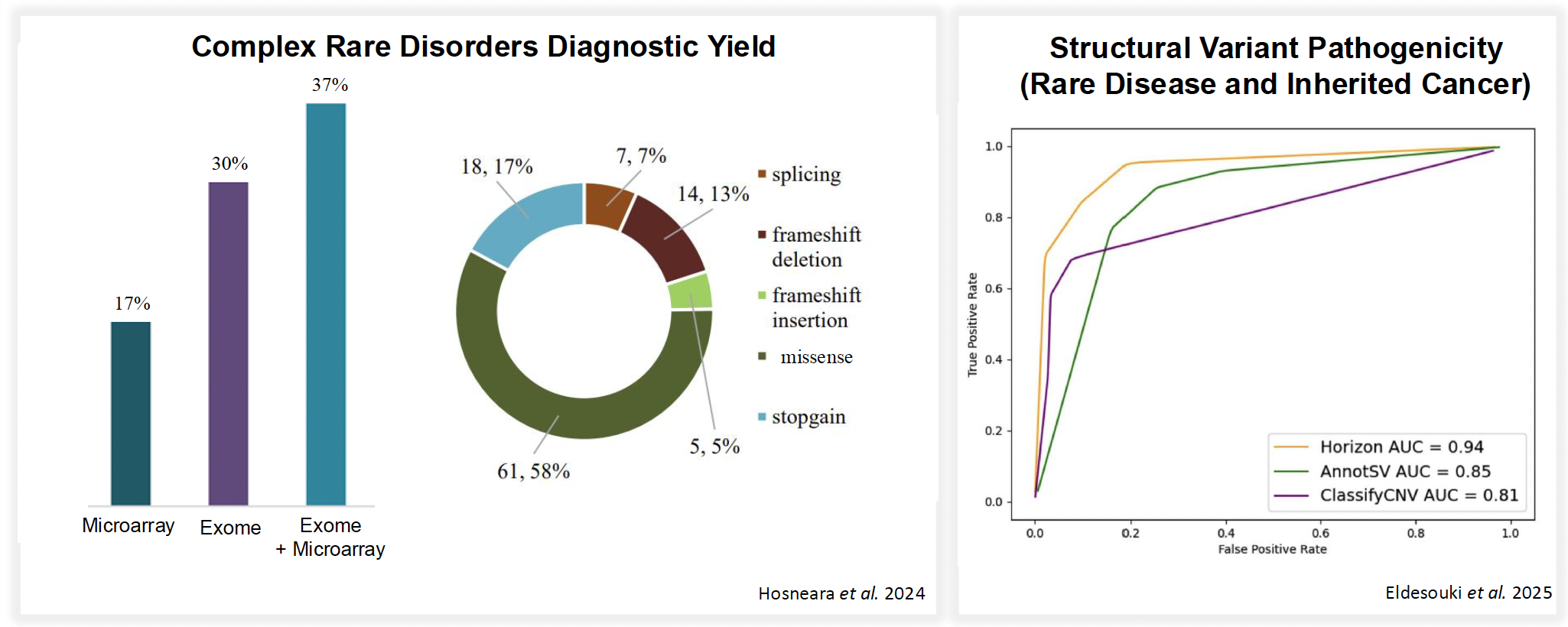
Introducing GenomeArc Horizon Transforming Genetic Diagnosis Integrating Multi-OMICs
We are excited to announce the official launch of our most comprehensive version (2.0) of GenomeArc HorizonTM, a groundbreaking clinical genetics platform designed to advance precision medicine through multi-OMICs integration, rapid analysis, and actionable insights. GenomeArc Horizon™ enhances rare disease and cancer genetic diagnostics by delivering rapid, precise molecular insights that empower clinicians and researchers to identify treatment options with unparalleled speed and accuracy.
One of the core strengths of GenomeArc HorizonTM is its ability to deliver ultra-fast ACMG guided diagnosis for rare diseases and inherited pan cancer. The latest breakthrough enables ACMG-guided tertiary analysis of a whole human long-read genome (~5 million variants in VCF) to be completed in just 10 minutes—a record-setting achievement in genetic diagnostics and targeted therapeutics. This advancement accelerates NICU/PICU diagnosis, enables population-scale studies, allowing for deeper exploration of each sample and genome with unprecedented clarity and precision. Analysis includes family analysis of tumor-germline pair analysis to report - carrier screening (for 4,000 rare conditions), actionable secondary findings, somatic variants, tumor burden analysis, and pharmacogenomic insights. Validation from different clinical cohorts shows GenomeArc HorizonTM outperforms other clinical genomic algorithms/tools and provides additional insights to increase diagnostic yields.
The current version is fully compatible with long-read sequencing technologies, supporting analysis of repeat expansions, inversions, translocations, and copy number variants. GenomeArc Horizon™ integrates SeqRx, a proprietary pharmacogenomic database, which now includes pharmacological insights on over thousands of drugs derived from rare disease and cancer clinical trials or research cohorts. This significantly empowers actionable capabilities by providing potential therapeutic insights. GenomeArc Horizon™'s clinical variant and pharmacogenomic databases are regularly updated, enhancing insights and increasing precision over time.
Integrating proteomics and single-cell data with genomics provides a comprehensive view of biological systems, bridging the gap between genetic variation and functional outcomes. GenomeArc Horizon™ integrates single cell transcriptomes from (over 20 vital tissues), and a developmental map of proteomics. The default multi-OMICs data shows the variant impacted genes and their corresponding up/down regulated cell types and protein expressed tissue. The current version of the platform enables the integration of patient-derived single-cell transcriptome and proteomics data, providing a comprehensive multi-OMICs profile for each patient.
GenomeArc Horizon™ implemented algorithms to detect somatic variants from germline-tumor pair (VCF files) with variant detection sensitivity up to 1%. In addition, the platform offers somatic variant profiling from liquid biopsy samples, a minimally invasive approach to analyzing genetic material circulating in bodily fluids. GenomeArc Horizon™ algorithm can analyze liquid biopsy variants and predict cancer types based on its training data. This technology holds immense promise for early cancer detection, treatment monitoring, and personalized cancer care. By integrating ultra-fast ACMG-guided diagnosis, pharmacogenomics, multi-OMICs analysis, and Horizon Intelligence, liquid biopsy profiling will enable predictive cancer analysis and improve early detection.

Figure 1. GenomeArc Horizon™ diagnostic yield from complex rare disorders cohorts, including structural variant validation rate compared to other tools.
Horizon Intelligence, our advanced AI, drives ACMG-guided diagnostic insights, pharmacogenomics, and multi-OMICs analysis. A key differentiator of GenomeArc Horizon™ is the seamless integration of Horizon Intelligence and its agent across the platform. The Horizon Intelligence agent can transform unstructured phenotypic data into in silico gene panels, directly linking patient phenotypes with genomic variants to enhance diagnostic accuracy and improve clinical outcomes.
The latest version of GenomeArc Horizon™ Intelligence introduces a dynamic language model that delivers insights through natural language prompts. Acting as an intelligent agent, the model can dynamically learn from on-site genomes within GenomeArc Horizon™, allowing users to search for variants using simple, intuitive language. This capability streamlines variant searches across projects, empowering scientists and clinicians with deeper insights. The search is highly flexible, enabling identification of clusters of samples with shared variants or those affecting specific genes. It also extends to structural variants, highlighting key genes associated with Mendelian diseases and pan-cancer conditions.
GenomeArc Horizon™ is designed with healthcare professionals in mind, providing seamless integration into existing clinical and research workflows. Its intuitive interface and interoperability among multi-OMICs datasets ensure that healthcare institutions can implement the platform without disrupting their current operations. GenomeArc Horizon™ accelerates the delivery of actionable insights, whether it’s through ultra-fast ACMG-guided diagnoses, tumor or liquid biopsy profiling or through pharmacogenomics insights. This adaptability positions the platform as a key player in advancing genomic medicine across diverse clinical environments.
GenomeArc Inc. is a biotech company on clinical genetics and drug discovery headquartered in Mississauga, Ontario. The company began its journey in 2021, GenomeArc develops artificial intelligence integrated solutions for genetic diagnosis and genomic drug development solutions for rare genetic disorders and pan cancer. As a research-oriented biotech company, GenomeArc brings new insights into rare diseases, cancer diagnosis, and therapeutics through genome analysis. The GenomeArc team is constantly innovating technologies to solve phenotypic complexities in genetic variations for rapid intervention. As a global company, our aim is to make efficient and accurate genome medicine technologies accessible for all healthcare systems.
See more Blogs: